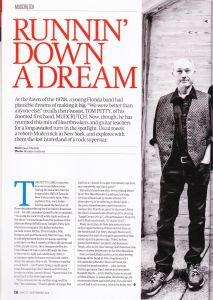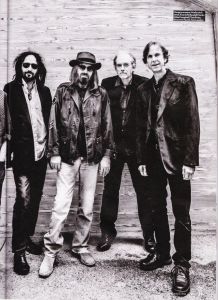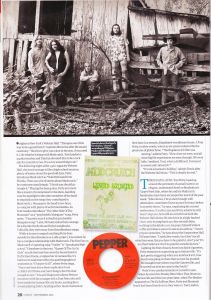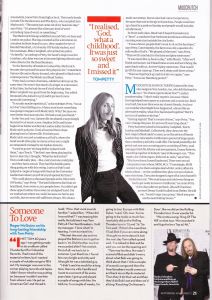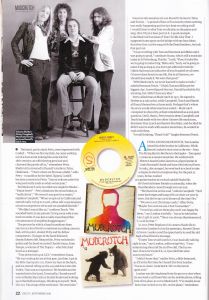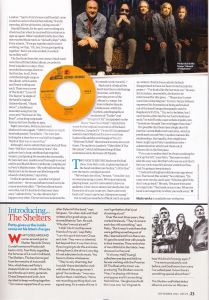Runnin' Down A Dream
By Jaan Uhelskzi
Uncut - September 2016
At the dawn of the 1970s, a young Florida band had plausible dreams of making it big. "We were better than anyone else," recalls their bassist, TOM PETTY, of his doomed first band, MUDCRUTCH. Now, though he has reunited this mix of Heartbreakers and guitar teachers for a long-awaited turn in the spotlight. Uncut meets a reborn Mudcrutch in New York, and explores with them the lost hinterland of a rock superstar.
Tom Petty came to success in a very roundabout way. During his induction into the Songwriters Hall Of Fame in New York in early June, Petty explains that, even today—having spent the best part of three decades refining back-to-basics American rock—he still considers himself to be an outsider. "I'm sorta the rock'n'roll white trash section of the show," he deadpans from the podium of the Marriott Marquis Ballroom. Tonight, Petty is in illustrious company. His fellow inductees include Lionel Richie, Elvis Costello, Nile Rodgers and posthumously, Marvin Gaye. Petty is suitably dressed for the occasion, sporting a military-cut black tuxedo, a black silk shirt and a thin purple cravat. He is inaugurated by his friend Roger McGuinn and although the tone of the event is light and celebratory, Petty's acceptance speech shares several hard truths about the nature of his craft. "Writing a song for a rock band—you'd better bring a really good song, because they don't take it well if it's not," he says in a slow, laconic drawl. "Many times I've gone back to the drawing board.
"If no-one ever wrote another song, we'd be fine," he continues. "There's plenty of songs. But I still do it. I love it, it's a gift. Everybody can do it, but everybody can't do it good."
But which band exactly is Petty talking about here? The Heartbreakers, perhaps; his long-serving sidemen on 13 studio albums? Or alternatively, is he referring to Mudcrutch—the proto-Heartbreakers outfit formed in Gainesville, Florida in 1970? In the event, Petty decides to honour both of his bands by playing "Angel Dream (No 4)", a Heartbreakers deep cut, and a Mudcrutch track, "I Forgive It All."
Many musicians in their late maturity have only a vague memory of their earliest days on the bandstand. For Petty, though, Mudcrutch represents the start of a creative partnership that exists up to the present day. There, he first worked with Mike Campbell and Benmont Tench, who in the intervening years have become Petty's closest lieutenants in the Heartbreakers.
Petty revived Mudcrutch in 2007, after seeing footage of the band in Peter Bogdanovich's documentary, Runnin' Down A Dream. He invited the band members—who include rhythm guitarist Tom Leadon and drummer Randall Marsh—to his Malibu home to record a debut album, 32 years after they broke up. He reconvened them again his year, for a second record and a sell-out tour, which includes two nights at New York's Webster Hall. "Tom goes out of his way to be a good friend," explains McGuinn after the award ceremony. "He tries to give you a shot in the arm, if you need it. Like what he's doing with Mudcrutch. Tom Leadon is a guitar teacher and Tom has elevated him to be a rock star for a month or two. It's a very sweet thing to do."
The following night at the 1,500-capacity Webster Hall, the mood onstage is like a high school reunion: plenty of banter about the good old days. Petty introduces Mudcrutch as "that little band from Florida. There are a lot of stories about Mudcrutch," he continues tantalisingly. "I think you should go Google it." Playing the bass guitar, Petty acts more like a master of ceremonies for the show, handing over the spotlight to the other members of the band to sing lead on the songs they contributed to Mudcrutch 2. He peppers the band's two-hour, 20-song set with plenty of well-timed asides. As Tom Leadon introduces "The Other Side Of The Mountain" as a "psychedelic bluegrass" song, Petty notes, "I'm pretty sure it is the first psychedelic bluegrass song." Later, McGuinn joins them onstage for a dip into the Byrds and Dylan songbooks. Critically, they steer away from Heartbreakers songs.
While it is easy to regard anything Petty does outside the Heartbreakers as a side-project, it is evident he has a complex relationship with Mudcrutch. The first line on Mudcrutch 2's opening song "Trailer" is "I graduated high school." Elsewhere in their set, "Queen Of The Go Go Girls" recalls the time they were the house band at Dub's Steer Room, a topless bar in Gainesville. It's hard not to read more reflective autobiographical sentiment in "I Forgive It All," where Petty sings, "I have not been down these roads since I was a child/I ain't broke and I ain't hungry but I'm close enough to care." It is as if Mudcrutch allows Petty to reconnect with his younger self: a Tom Petty who still lives inside the Gainesville city limits, earning $100 a week playing Dub's, hosting ad hoc music festivals at their base in a remote, dilapidated woodframe house. A Tom Petty, in other words, who is as yet unencumbered by the pressures of global fame. "The Bogdanovich film was moving," admits Petty. "How close we were, and all those big life experiences we went through. We were kids, I realised, 'God, what a childhood. It was just so sweet and I missed it.'"
"It's not a busman's holiday," admits Tench after the Webster Hall show. "This is deadly for real."
Three days later, Tom Petty is pacing around the perimeter of a small suite in an elegant, understated hotel on Manhattan's Upper West Side, where he and his Mudcrutch bandmates have been encamped for much of the past week. "After shows, I'm so shot through with adrenaline, sometimes I have to pace for hours before I can settle down," he says, explaining his current restlessness. It is after 7pm and Petty admits he still hasn't slept yet, he is still too wired from both the Webster Hall shows. He sits down in a high-backed chair, only to jump back up a few seconds later; walking to the drinks cart, he pours himself a black coffee and takes a saucer to use as an ashtray. "I never prepare speeches," he says about the Songwriters Hall Of Fame event. "I said a few words, but I don't recall what they were. But you have to be grateful, don't you? It's not that I believe it. But I'm grateful somebody does."
Lighting the first of many American Spirit cigarettes, Petty reminisces on growing up in Gainesville. "It's just pretty staggering when you look back at it, how much was going on there that we took for granted. We thought everywhere was like Gainesville, and it turned out to be an oasis in the South."
Petty's two eureka moments occurred in 1962, when he saw Elvis Presley film Follow That Dream in Gainesville and then two years later, when The Beatles appeared on The Ed Sullivan Show. Petty and Benmont Tench had been friends since they were 11; Tom Leadon, meanwhile, knew Petty from high school. Their eaeily bands include The Sundowners and The Epics, who morphed into Mudcrutch. "The name just came out of my head one day," says Petty. "It's almost like a Kerouac kind of word—a Ginsberg type of word, or something."
The Mudcrutch lineup solidified around Petty on bass and Leadon on guitar. Placing a wanted ad for a drummer on a student bulletin board in 1970, they caught the eye of Randall Marsh, a University Of Florida student, and his roommate, Mike Campbell, who joined on guitar. "So briefly," according to Petty, the band's singer was Jim Lenahan, who later went on to become lighting director and video director for the Heartbreakers.
"In the hierarchy of bands in Gainesville, Mudcrutch became the top band because they played a lot," remembers Gainesville native Marty Jourard, who played in Mudcruch contemporaries The Motels and Road Turkey.
"Petty had a certain charisma, subtle but obvious at the same time. He wasn't that much of a singer or a showman at that time, but he had the rock'n'roll vibe big-time. Mike Campbell was great from the beginning. You added Benmont [who joined in 1972] and it got much more musically interesting."
"It sounds maybe egotistical," acknowledges Petty, "but at 65 I don't mind telling you: I damn sure knew something was going to happen with Mudcrutch. Why? Because we were better than anyone else. We had a real good band,"
In the '60s and '70s, Gainesville incubated a surprisingly buoyant local music scene. Stephen Stills and future Eagles Don Felder and Bernie Leadon (elder brother of Mudcrutch guitarist, Tom) all earned their chops playing bars in Gainesville. For their part, Mudcrutch secured a residency at Dub's, where the band would often play as many as four sets a night accompanied onstage by six topless dancers.
"I used to go see 'em long before I played with them," says Tench. "The first I saw them playing this bar in Lake city, I thought, 'What the hell is this?' They could really play—like, every last one could play—and they had a sound. They had the double guitar thing going on with this swing. I sat in at Dub's and I played a couple of songs with them at the University Auditorium when Lynyrd Skynyrd opened for them."
"We could always play to a thousand people at the University Of Florida," says Petty. "The last Halloween Ball that we headlined, there were 10,000 people there. You didn't get those opportunities if you were an unsigned band. But we worked anywhere we could, because we had to pay our bills, but we were self-sufficient always. We always made our money, but we also had concert experience, because that was in the air those days. People would set up a band in a park on Sunday and people would just play all afternoon."
In those early days, Mudcrutch based themselves in a "farm," a rundown four-bedroom farmhouse without hot running water just outside the city limits.
"It was a hovel, people didn't want to sit on the furniture," says Petty. Conveniently, the farm was only a quarter of a mile walk to Dub's. "We played all the time," says Petty. "Then we'd come back to the farm and play some more."
"It was more like 24 hours a day," adds Marsh. "After we'd finish our last set, we'd head home at 2am and we'd bring the party back with us. And we'd play some more. That would go till the sun came up. Then we'd sleep until three or four."
"Then we'd get back up and do it all over again," says Petty. "It was our Hamburg period."
Mudcrutch soon outgrew Gainesville; they also outgrew Tom Leadon, too, who left the band in 1972. "Do I have regrets about that?" Leadon ponders today. "I don't really regret it, because I think leaving helped me to grow as a person and a musician. But it was hard, because they were my closest friends. And you can wonder what might have happened, almost like an alternative reality, what if we had stayed together? But it's just sort of useless to do that."
"Having regrets? That's a waste of time," says Petty. "You can't change the past. It's not worth worrying about."
Petty has been joined in his suite by Campbell, Tench, Leadon, and Marsh. Collectively, they chew over the next stage in Mudcrutch's career, as on the advice of Bernie Leadon they relocated to California in pursuit of larger goals that a residency at Dub's could offer. The band pooled $50 for petrol and sent out a scouting party consisting of Petty, road manager Keith McAllister and new guitarist, Danny Roberts, travelling together in Roberts' 1969 Volkswagen van. "They made a lot of demo tapes, little reel-to-reels," says Petty. "We drove down Sunset Boulevard. There were record companies everywhere, MGM, RCA." Promisingly, MGM wanted to give them a singles deal while London offered a whole album—on the condition they play covers in clubs to earn their keep. "We went home and sold everything we had to get ready to move to California," recounts Petty. "A few days after we got back, [Russell's business partner] Denny Cordell called from Shelter. He told me, 'I want to sign your group. I think you guys are the next Rolling Stones.'"
The band, particularly Petty, were impressed with Cordell—"When we first met him, he came walking out of a dust storm looking like some kind of 18th-century cat with blowing grey hair and charmed the panels off us," remembers Petty. Mudcrutch convened in Russell's studio in Tulsa, Oklahoma—"That's where we first saw a bidet," adds Petty—to audition for the label. Signed, Cordell became a mentor for Petty: "Denny took me under his wing and really made us what we became."
But Mudcrutch only recorded one single for Shelter—"Depot Street"—Petty dismisses the record today as "really shitty." "We weren't any good in a studio," explains Campbell. "When we got out to California and started really trying to record, either self-consciousness or just incompetence set in and we sounded like hell."
"We didn't sound like us," confirms Tench. "We sounded better in my parents' living room with a two-track recorder. It was just a really sweet band that circumstances of stupidity dragged apart."
The process by which a band transitions from success at a local level to a national recording concern had, at this point, eluded Petty and his fellow conspirators. Changes in the band followed. Danny Roberts left. Meanwhile, Petty switched to guitar and the band recruited Charlie Souza, from Tampa, a veteran of the Tropics—who Petty had loved as a teenager.
"Tom picked me up at LAX," remembers Souza. "He was waiting for me at that gate, just him. I got in his little Opel sports car, threw my bass in the back, and we started riding up the 405 and down into the Valley. That was an experience. We bonded and he wanted me in the band. Eventually, I found myself over at Shelter Records on Sunset Boulevard looking up at the Hollywood sign, thinking to myself, 'Well, this is it. I'm on top of the world now.' We were kids."
Souza recalls sessions at Leon Russell's homes in Tulsa and Encino—"a period of four or five months where nothing was really happening and we just kept recording stuff. I would listen to what Tom would play on the piano and sing, then I'd put a bass part on it. A good example is the Mudcrutch version of 'Don't Do Me Like That.' I suggested some parts on the bridge with my bass ideas. But when they cut the song with the Heartbreakers, he took that part out."
"I was recording with Tom and Benmont and Mike and it was going so good," continues Souza, who is still a musician today in St. Petersburg, Florida. "I said, 'Wow, it looks like we're going to make it big.' Mike said, 'Yeah, we're going to make it big as long as you don't get addicted to heroin.' I think that was just indicative of how frazzled we all were. I'd never done heroin in my life. But in all fairness, we should have made it. We were that good."
"With Mudcrutch, we never learned to make records," admits Benmont Tench. "I think Tom and Mike got the biggest clue. I never figured that out. Randall probably did, all along, but I didn't have any idea."
Petty called time on Mudcrutch in 1975. He signed to Shelter as a solo artist, while Campbell, Tench and Marsh all found themselves at loose ends. Perhaps that's where the story would've otherwise have ended—Mudcrutch consigned to obscurity, at best remembered as a pop quiz question. Until, that is, Petty heard a demo Campbell and Tench had made with two other Gainesville musicians, drummer Stan Lynch and bassist Ron Blair, and decided he didn't want to work with session musicians, he wanted to work with them.
"I recall thinking, 'Thank god!'" laughs Benmont Tench.
After leaving Mudcrutch, Tom Leadon joined his elder brother in California. While Bernie Leadon's stock was on the rise—from The Flying Burrito Brothers to the Eagles—Tom spent 12 years as a session musician. He worked with Motown bassist James Jamerson, played guitar in Linda Ronstadt's band and bass with Johnny Rivers. In 1984, discouraged, he went back to school to take a degree in electrical engineering. For the last 25 years, he has worked as a guitar teacher at a school outside Nashville. He'd see his former friends occasionally, when the Heartbreakers came through town on tour.
"We'd see him on the road," admits Campbell. "He'd come backstage and hang with us when we were in town. But did we go out to dinner all the time? no."
"We never sent Christmas cards," offers Petty. "Maybe Tom sent me one. I don't remember."
"I would go and see them play and I was happy for them," says Leadon wistfully—but as he told writer Alan Light in 2008, "There was always that element of, 'I could do that.'"
In 2007, Peter Bogdanovich came to Nashville to interview Leadon for his documentary, Runnin' Down A Dream. Leadon used the opportunity to send his old high school friend a message.
"I knew Tom would watch it, I was basically talking right to you," says Leadon, addressing Petty. "I was reminiscing about all the stuff we did. The fun we had. I knew he'd watch it, so I just told him what was in my heart."
"I didn't know that," replies Petty, a little bemused, as if it is the first time he's heard this from Leadon. "It was so sweet. I watched it. He's in the movie quite a bit."
Leadon was driving home from the grocery store when he received a call from Petty on his mobile phone, telling him of his plans to revive Mudcrutch. "I've maybe never been that excited in my life, on the plane," remembers Leadon. "I got to Tom's house and Randall came in and we were in the kitchen talking 'til early morning, all the old stories, joking around."
Randall Marsh, for his part, was working as a drum teacher when he received his invitation to sign up again. Mike Campbell fondly describes the reunited Mudcrutch as "old salty dogs" while Petty admits, "If we got together and it wasn't working, we'd go, 'Oh hey, it was good getting together.' But it not only worked, it worked incredibly well."
The first fruits of the 21st-century Mudcrutch were the self-titled debut album, recorded in Petty's studio in 10 days. They recorded four songs alone on the first day. In all, Petty contributed eight songs to the album, with Leadon and Tench writing one each. There was a cover of The Byrds' "Lover Of The Bayou" (a staple of the band's original Gainesville set), "Shady Grove," a traditional mountain song from the 1700s and "Six Days On The Road," a trucking song made famous by Dave Dudley in 1963.
Eight years later, Petty reconvened Mudcrutch once again. "I didn't realise so much time had passed," he admits. "We were just looking for a time that we could all do it again. The first time was so much fun."
Although Leadon admits that a second call from Petty "felt like I won the lottery twice," the guitarist had a lung condition that required surgery, postponing the reunion for six months. By June last year, Leadon was fit enough to record and he and Marsh flew to California, camping out in Petty's Malibu home. "My wife told me having Mudcrutch in the house was like living with a bunch of old pirates," says Petty.
Unlike its predecessor—a product of speed and instinct—the second album turned out to be a more involved affair. "The first album has its own vibe, but it's hard to do that more than once," admits Petty. "10-day albums don't happen very often. The second one took months. Not steady work, but still..."
Mudcrutch 2 finds all the band members contributing this time, with Petty penning seven of the album's 11 songs. It is more cohesive than its predecessor, while the hushed, autobiographical sentiment of "Trailer" and "I Forgive It All" is expanded on the blurry "Save Your water," which Petty wrote for the original incarnation of the band. Elsewhere, Campbell's "Victim of Circumstance" seems to track Mudcrutch's move west from Gainesville and the retro boogie of Tench's "Welcome To Hell" throws back to more innocent times. The outlier is Leadon's "Other Side Of The Mountain," which addresses the gulf that sometimes exists between old friends.
Two nights before Mudcrutch's final show, Tom Petty calls, explaining that all the band members are feeling "a little blue" now that the tour is coming to an end.
"We've had a lot of fun," he says. "I wouldn't say we were pursuing a career. We're just enjoying playing music, and it's convenient to have an audience. I don't know about everybody else, but I have a lot of music in me yet. I have a lot in my head and I want to get it out. It keeps me young."
But not all past members of Mudcrutch are quite as content. Charlie Souza admits he feels disappointed to have not been invited to join the project—"I'm kinda like the last man out," he says. Jim Lenahan, meanwhile, dclined to be interviewed for this piece—"Please don't waste your time contacting me." In 2007, Danny Roberts expressed his frustration at being airbrushed out of the band lineup photographs used in Bogdanovich's film. "I try not to be bitter, but I can't but be a little hurt by such an intentional snub," he told Florida coast website tcpalm.com. "I somehow thought Tom was bigger than that."
It is possible that these men simply don't fit into the current Mudcrutch narrative, which is predicated around Petty's earliest Gainesville relationships. But equally, they might have been caught up in Petty's ambitious drive—a determination which took them out of Gainesville in the first place.
"I've come to realise that I'm always pushing the rock up the hill," says Petty. "Because we don't take the easy way. But that's who we are and that's the way we do it and it's always worked out fine. And I'm going to keep doing it.
"Lindsay Buckingham told me years ago about how Fleetwood Mac ended," he continues. "He came over one day and I said, 'Why the split? Why don't you go back?' He said, 'Because it became no longer holy.' That made sense to me. When the band is no longer holy is when you walk away."
Someone To Love: Roger McGuinn on his long-lasting friendship with Tom Petty
"I met Tom 40 years ago. I was getting ready to do an album called Thunderbyrd for Columbia Records. I had most of the material written, but I wanted a couple of outside songs to fill it out. My manager was over in the corner playing records and tapes. I didn't know what he was putting on, because I couldn't see him from where I was. He put on 'American Girl' and I loved it. I said, 'Wow, that vocal sounds familiar!' I asked him, 'When did I record that?' I was teasing him really. He told me it was Tom Petty & The Heartbreakers. I told my manager, 'I love what I'm hearing. I want to meet him.
"We met the next day and we played the Bottom Line together back in '76. Did it bother me that we sounded alike? Not one bit. First of all, we had a lot in common. I just liked him. I found him very bright and witty and I thought he was a talented guy.
"I didn't see him much for a long time, then my wife Camilla and I went to a concert of his some years later. I got up and played a couple of songs with him. He told me, 'In a couple of weeks, I'm going to tour Europe with Bob Dylan.' I said, 'Oh man. You're going to be made so much fun. I certainly did on the Rolling Thunder tour in '75 and '76.' So Tom said, 'If that's the case then I'll ask Bob if you can come along.' I thought no more about it, but the next day Tom called up and said, 'I've talked to Bob and he said you can be the opening act.'
"Tom was fearless. He wasn't scared of Bob and din't worry about Bob was going to think about that. I'd do a couple of acoustic songs and then the Heartbreakers would come out and back me on Byrds material. Then they'd do their set and then they'd do Bob's set and then we'd all sing 'Knocking On Heaven's Door,' like we did on the Rolling Thunder tour. It was wonderful.
"We wrote a song, 'King Of The Hill' on that tour. We recorded it and it got to be a Top 40 hit."
Introducing...The Shelters: Petty gives us the inside scoop on his latest charges
What goes around comes around: just as Shelter Records' Denny Cordell mentored Mudcrutch back in 1975, Tom Petty is guiding the fortunes of LA rock'n'roll band, The Shelters. The band emerged from the remains of Automatik Slim, which featured Petty's stepson Dylan on vocals. When the band broke up in 2013, guitarists Chase Simpson and Josh Jove decided to keep working together. "Tom was so supportive of us, even after Dylan left the band," says Simpson. "So when Josh and I had written a few good songs, we showed them to Tom. He said, 'Why don't we cut a track?'"
"I didn't do it 'cos they were friends of my son," says Petty. "I saw this spark between Chase and Josh. They were so talented, but beyond that, it was their drive. If you're going to do this and make a living from it, the drive is very big. It's not a decision to do music. You have no choice whatsoever.
"They're very charming, but I wouldn't have decided to work with them if the songs weren't good," he continues. "I was very hard on them. I told them, 'We're not recording anything that's not a good song. It's a waste of time. It won't get better; that's just chroming a turd."
Over the next three years, they worked tirelessly. "They'd come in each day with something," says Petty. "But it wasn't only them that were getting something out of this. I learned a lot from them, too. It's good to spend time with people in their twenties. They remind me of me a little bit in the 1960s. I was obsessed as they are!
"It's funny. Neil [Young] called me one day and told me he was working with the Promise Of The Real at the time I was producing The Shelters record, 'Man, I'm playing with these young guys and it's so exciting,' Neil told me. I laughed and told him I was, too. 'Isn't it great to hear this kind of energy again?'
"I've never produced a rock before, and God knows how many I've walked past. I know there's something special about them."

